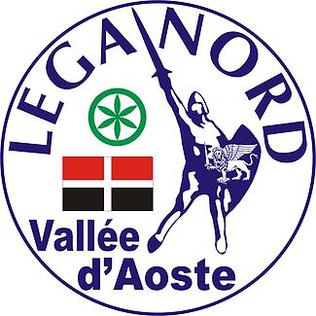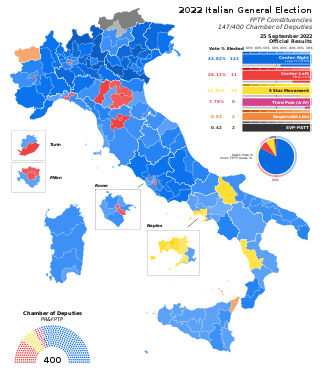Notes
| Regional elections | |
|---|---|
| General elections | |
| European Parliament elections | |
The Italian general election of 2018 took place on 4 March 2018.
In its two single-seat constituencies, Aosta Valley elected Elisa Tripodi (Five Star Movement) to the Chamber of Deputies and re-elected Albert Lanièce (Valdostan Union, Aosta Valley coalition) to the Senate. Tripodi was the first woman to be elected from the region and the first candidate not supported by a regionalist coalition.
| Candidate | Party or alliance | Votes | % | |||
|---|---|---|---|---|---|---|
| Elisa Tripodi | Five Star Movement | 15,999 | 24.11 | |||
| Alessia Favre | Aosta Valley coalition | Progressive Valdostan Union | 14,429 | 21.74 | ||
| Giampaolo Marcoz | For All coalition | Independent | 12,118 | 18.26 | ||
| Luca Distort | League | 11,588 | 17.46 | |||
| Edoardo Melgara | Centre-right [lower-alpha 1] | Forza Italia | 5,533 | 8.34 | ||
| Chiara Minelli | Civic Response | 2,623 | 3.95 | |||
| Francesco Rappazzo | Power to the People | Communist Refoundation Party | 1,700 | 2.56 | ||
| Lorenzo Aiello | CasaPound | 1,205 | 1.82 | |||
| Daniela Glarey | Human Value Party | 1,175 | 1.77 | |||
| Total | 66,370 | 100.00 | ||||
| Valid votes | 66,370 | 92.25 | ||||
| Invalid/blank votes | 5,577 | 7.75 | ||||
| Total votes | 71,947 | 100.00 | ||||
| Registered voters/turnout | 99,547 | 72.27 | ||||
| Source: Ministry of the Interior | ||||||
| Candidate | Party or alliance | Votes | % | |||
|---|---|---|---|---|---|---|
| Albert Lanièce | Aosta Valley coalition | Valdostan Union | 15,958 | 25.76 | ||
| Luciano Mossa | Five Star Movement | 14,398 | 23.25 | |||
| Paolo Sammaritani | League | 11,004 | 17.77 | |||
| Luisa Trione | For All coalition | Edelweiss | 9,659 | 15.59 | ||
| Orlando Navarra | Centre-right [lower-alpha 1] | Forza Italia | 5,223 | 8.43 | ||
| Fabio Protasoni | Civic Response | 1,911 | 3.09 | |||
| Alexandre Glarey | Power to the People | Communist Refoundation Party | 1,688 | 2.73 | ||
| Sonny Perino | CasaPound | 1,207 | 1.95 | |||
| Annita Prezzavento | Human Value Party | 890 | 1.44 | |||
| Total | 61,938 | 100.00 | ||||
| Valid votes | 61,938 | 92.90 | ||||
| Invalid/blank votes | 4,732 | 7.10 | ||||
| Total votes | 66,670 | 100.00 | ||||
| Registered voters/turnout | 92,087 | 72.40 | ||||
| Source: Ministry of the Interior | ||||||

The regions of Italy are the first-level administrative divisions of the Italian Republic, constituting its second NUTS administrative level. There are twenty regions, five of which are autonomous regions with special status. Under the Constitution of Italy, each region is an autonomous entity with defined powers. With the exception of the Aosta Valley and Friuli-Venezia Giulia (2018–2020), each region is divided into a number of provinces.

The Senate of the Republic, or simply the Senate, is the upper house of the bicameral Italian Parliament, the lower house being the Chamber of Deputies. The two houses together form a perfect bicameral system, meaning they perform identical functions, but do so separately. Pursuant to the Articles 57, 58, and 59 of the Italian Constitution, the Senate has 200 elective members, of which 196 are elected from Italian constituencies, and 4 from Italian citizens living abroad. Furthermore, there is a small number of senators for life, either appointed or ex officio. It was established in its current form on 8 May 1948, but previously existed during the Kingdom of Italy as Senato del Regno, itself a continuation of the Senato Subalpino of Sardinia established on 8 May 1848. Members of the Senate are styled Senator or The Honourable Senator and they meet at Palazzo Madama, Rome.

National-level elections in Italy are called periodically to form a parliament consisting of two houses: the Chamber of Deputies with 400 members; and the Senate of the Republic with 200 elected members, plus a few appointed senators for life. Italy is a parliamentary republic: the President of the Republic is elected for a seven-year term by the two houses of Parliament in joint session, together with special electors appointed by the Regional Councils.

The Valdostan Union, also Valdostian Union or Valdotanian Union, is a regionalist and centrist political party in Aosta Valley, Italy. It represents mainly the French-speaking minority in the region. One of its leading members, Renzo Testolin, has been the President of Aosta Valley since March 2023, replacing Erik Lavévaz, also of the UV.

Edelweiss is a regionalist, Christian-democratic political party active in Aosta Valley, Italy.
Valdostan Renewal was a social-liberal Italian political party active in the Aosta Valley.

Aosta Valley is a regionalist coalition of parties active in Aosta Valley, Italy.

A snap election was held in Italy on 13–14 April 2008. The election came after President Giorgio Napolitano dissolved the Italian Parliament on 6 February 2008, following the defeat of the government of Prime Minister Romano Prodi in a January 2008 Senate vote of confidence and the unsuccessful tentative appointment of Franco Marini with the aim to change the current electoral law. Under Italian law, elections must be held within 70 days of the dissolution. The voting determined the leader of Italy's 62nd government since the end of World War II. The coalition led by ex-Prime Minister Silvio Berlusconi from The People of Freedom party defeated that of former Mayor of Rome, Walter Veltroni of the Democratic Party.

Lega Vallée d'Aoste, whose complete name is Lega Vallée d'Aoste per Salvini Premier, is a regionalist political party active in Aosta Valley. The party was a "national" section of Lega Nord (LN) from 1991 to 2000 and has been the regional section of Lega per Salvini Premier (LSP) in Aosta Valley since 2020.

The politics of Aosta Valley, Italy, have since 1946 taken place in a framework of a parliamentary representative democracy, whereby the president of Aosta Valley has been the head of government, and of a pluralistic multi-party system. The regional government has exercised legislative power, vested in both the government and the Regional Council of Aosta Valley.

This page gathers the results of elections in Aosta Valley.

The 2013 Italian general election was held on 24 and 25 February 2013 to determine the 630 members of the Chamber of Deputies and the 315 elective members of the Senate of the Republic for the 17th Italian Parliament. The centre-left alliance Italy Common Good, led by the Democratic Party (PD), obtained a clear majority of seats in the Chamber of Deputies thanks to a majority bonus that effectively trebled the number of seats assigned to the winning force and narrowly defeated the centre-right alliance of former Prime Minister Silvio Berlusconi in the popular vote. Close behind, the new anti-establishment Five Star Movement of comedian Beppe Grillo became the third force, well ahead of the centrist coalition of outgoing Prime Minister Mario Monti. In the Senate, no political group or party won an outright majority, resulting in a hung parliament.
The Italian general election of 2013 took place on 24–25 March 2013.
The centre-left coalition is a political alliance of political parties in Italy active under several forms and names since 1995, when The Olive Tree was formed under the leadership of Romano Prodi. The centre-left coalition has ruled the country for more than fifteen years between 1996 and 2022; to do so, it had mostly to rely on a big tent that went from the more radical left-wing, which had more weight between 1996 and 2008, to the political centre, which had more weight during the 2010s, and its main parties were also part of grand coalitions and national unity governments.
For Our Valley is a centrist political party active in Aosta Valley, Italy.
For All was a regionalist coalition of parties active in Aosta Valley, Italy.

The law no. 270 of 21 December 2005 was a proportional electoral law with a majority prize and blocked lists that regulated the election of the Chamber of Deputies and the Senate in Italy in 2006, 2008 and 2013.
The 2022 Italian general election took place on 25 September 2022. In its two single-seat constituencies, Aosta Valley elected Franco Manes to the Chamber of Deputies and Nicoletta Spelgatti to the Senate of the Republic. Spelgatti, a former president of Aosta Valley, was the first Valdostan woman elected to the Senate.

The 2022 Italian general election took place on 25 September 2022. In Trentino-Alto Adige/Südtirol, 14 seats were up for election: 8 for the Chamber of Deputies and 6 for the Senate of the Republic.

The 2022 Italian general election was held on 25 September, resulting in a majority of seats of both houses of the Italian Parliament for the centre-right coalition. The Meloni Cabinet was announced on 21 October and was officially sworn in on the next day. The first Cabinet headed by a female Prime Minister of Italy, it was variously described as a shift to the political right, as well as the first far-right-led Italian government since World War II. The Meloni Cabinet successufully won the confidence votes on 25–26 October with a comfortable majority in both houses of Parliament.